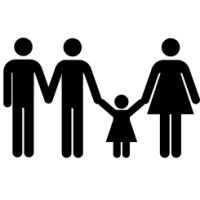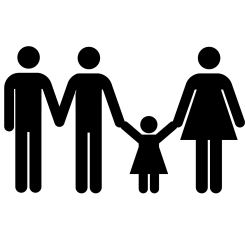
Families with more than two adults are on the rise, along with other families of choice beyond a nuclear model.
Many don’t realize that legal options exist to provide stability and protect these family connections. If you’re in one of these families, take steps to secure and clarify your parenting or partnership rights when legally possible, and make contracts between yourselves to minimize potential disagreements.

What kinds of families have more than two adults?
My clients and community include polyamorous families of three or more committed partners, some of whom may be metamours – those who share a partner and familial bond without being romantically connected. Some of these polyamorous families include children, and some of those co-parent as three or four, while others maintain the structure of two parents with their other partner(s) as loving adults to their children like aunts and uncles, but not parents. (It is critical to pick a side, as I’ll explain below.)
These polyamorous families have overlapping legal concerns with multi-parent families, which are most often a female same-sex couple who are co-parenting with a platonic male friend, who does not relinquish his rights as a sperm donor but instead stays on as a dad, sometimes with a partner of his own in the parenting mix. This can be a much more organic and affordable option for biological parenting for gay men as compared to surrogacy, which often costs over $100,000 and several years of effort with matching programs, physicians and attorneys. Multi-parent families also arise in non-LGBTQ contexts, in which a woman might have two men in her life who take on the role of father (perhaps one who is a husband and one who is the biological father).
Finally, these issues overlap with platonic partnering, in which two or more adults who are not in a romantic relationship band together to live as a family, which may include female friends (or sisters) sharing a household and parenting duties, a woman opting to co-parent with her gay best friend, an adult banding together with a romantic couple as a family, or a small group of friends wishing to create the bonds of family. If the Golden Girls wished to share end of life caregiving, finances, estate-planning, and hospital visitation as family, they’d be in this category (and I’d love to have them as clients).
Let’s recognize the solidarity between all of these family forms, along with same-sex couples and those bucking the norm to live single or redefine their partnership, as different expressions of the desire to choose families in our own way outside of the heterosexual nuclear family model. We’re all in that movement together.
Are you a dad or a donor? Mommy or auntie? Be clear on whether a third adult is a parent.
When people create families of choice, they don’t have clear cultural models to follow. Many of us wing it, which can lead to misunderstandings and legal ambiguities. I see this most often with ambiguous parenting status. This happens sometimes when a female same-sex couple or single mother finds a male friend to “help” create a turkey baster baby, without making a clearly negotiated agreement on whether that male friend is a sperm donor with no rights or responsibilities or a father. This also happens when a polyamorous couple with children invites a serious partner to live with them as a family, without agreeing on the role this adult will play in their child’s life. Sometimes I see these families when disputes or misunderstandings have occurred – and I’d much rather help people sort this out in advance through clear communication and a written agreement.
by Diana Adams, Esq. – Family Law Institute Blog Post December 17, 2018
Click here to read the entire blog post.
The post WHAT POLYAMOROUS & MULTI-PARENT FAMILIES SHOULD DO TO PROTECT THEIR RIGHTS appeared first on Time For Families.
Source: Time for Families
